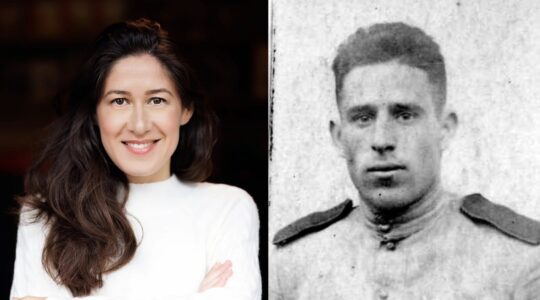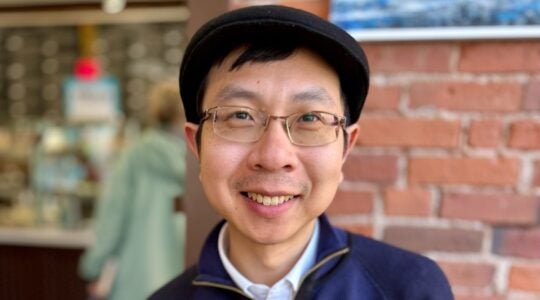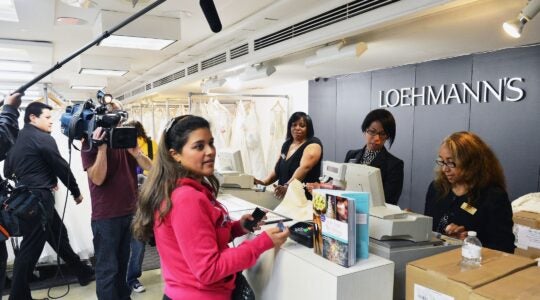With a chuckle in his voice and a gleam in his eye, as if my assertion — that college campuses were a hotbed of anti-Israel activity — were funny, Yitzhak Mansdorf moved on to his next question. How would I feel, he asked me, if on completing his program to educate young American Jews about the Israel-Palestinian conflict, I were no longer a Zionist?
I sat there dumbfounded for a few seconds.
There I was, on my post-high school gap year in Israel, interviewing for a fellowship sponsored by the Jerusalem Center for Public Affairs (JCPA) about the Mideast conflict. Rather than being asked what I’d done in support for Israel while I was in high school, or how I got involved with the Write On For Israel program (sponsored by The Jewish Week) or the pro-Israel lobby AIPAC, and rather than being asked what I thought was the greatest crisis within the Jewish world in terms of Israel support and advocacy (hint: the answer is always apathy), I felt like I was getting the third degree. And I was.
Such was my introduction to an unusual course that started out with two dozen or so young people who, like me, were recent day school graduates studying at Orthodox institutions in Israel before starting college back home. The course, known as The Leadership Program in Arab-Israel Studies and taught by Mansdorf, became a huge part of my year in Israel, and it changed my way of thinking about the conflict.
I realized from that initial interview that his program would likely bear no resemblance to any Israel advocacy program in which I’d ever participated. And it didn’t. In large part, this was due to the fact that Mansdorf, an American-born psychologist who made aliyah many years ago, was unlike any other educator I’d ever encountered.
He began his project seven years ago as a “traditional advocacy program” for gap-year students, but came to learn from them that there was a difference between what he was teaching and what they were seeing for themselves, living in Israel.
“Instead of preaching, ‘They’re [the Palestinians] always wrong and we’re always right,’ I try to present a more nuanced, more realistic view of Israel,” with an emphasis on context and background, he says.
His classes often feature discussion/debates between well-known guests who oppose each other on topics like a Palestinian state with Jerusalem as its capital, the tension between human rights and Zionism or the status of non-Jews in Israel. In addition, Mansdorf took us on field trips to experience what it’s like to go through a checkpoint in Jerusalem or to meet young Arabs critical of Israeli policy.
We had to write papers on these issues and defend our positions with logic rather than emotion. One assignment called for a lengthy response to a book by Jeff Halper, head of the Israeli Committee Against House Demolitions.
“I want students to grapple with the issues, including seeing the imperfections in Israeli society,” Mansdorf says, “but recognizing their responsibility to do something about it.”
The course was not for everyone. Almost half of our initial group dropped out (most of the boys) along the way, sometimes acknowledging they couldn’t take the disconnect between what they believed in and what they were being encouraged to confront and consider.
There was nothing that was taboo in that conference room where we sat every Tuesday. If students said something they couldn’t back up with evidence, they were handed an imaginary shovel, and told to “start digging.” I dug myself into many a hole by the end of the first month. But if you could find primary sources that supported you, your ideas were recognized and discussed.
For the first part of the year in class, I felt like I was being attacked for my support of Israel. I felt targeted by people who I thought were on my side. At some point, I realized that in fact they were just doing a more effective job of being on my side than I was.
On the first day of class, we discussed whether one member of our group, who was attending a yeshiva in a West Bank settlement, could be considered to not be spending the year living in Israel, since he was outside the Green Line.
It was an issue we’d all read about, but hearing it said out loud, from someone who was ostensibly on our side, was odd. Everything felt off. And that feeling, of something being amiss, stayed with me until spring. But I finally got to a point of clarity and calm.
Several of my friends had similar experiences.
Jacob Shamash, who was in the program last year, told me that “for the first time I was taught to think critically, to not automatically accept things that I seemed to agree with.” And Tzvi Wiesel, who was in my class, observed that we were taken out of our “comfort zone” by Mansdorf, and we soon realized that “we came in with too many preconceived notions to learn any other way.”
For example, one of our speakers asked us what was heavier, a pound of gold, or a pound of feathers. He went on to explain that a pound of feathers is actually heavier because it’s 16 ounces, while the weight measurement for gold is different, and a pound of gold is slightly less than 16 ounces.
His point? If you have even one misconception, the rest of your logic and deductive reasoning can lead you to the wrong conclusion.
An illustration of that came about when we visited a house in the Shimon Tatzadik/Sheikh Jarrah neighborhood. A Palestinian family and a religious Jew each claimed ownership. The Jew, who was part of a group staying in shifts at the house to bolster the claim of a continued Jewish presence there, told our group that Jews had once lived on the property so it was Jewish land.
But he acknowledged, when asked, that he lived in the Orthodox neighborhood of Har Nof, which had once belonged to Arabs. Did that mean Jews should now leave that neighborhood?
The man had no response.
I have been involved with a number of Israel advocacy programs, most of which taught us conclusions, not the process of coming to them. I happen to believe in most of those conclusions, but I realize now the importance of logic and independent thinking.
Mansdorf is well aware that his open approach presents an emotional and intellectual challenge, and not only to students. He acknowledges that he has been denied funding by some Israel advocacy groups because of his method. But he is proud to point out that some of his graduates have gone on to lead major pro-Israel groups on campuses like Columbia-Barnard, Yale, Harvard, Penn, Boston University and the London School of Economics.
Looking back, I can say that his course was an often unpleasant, frustrating and emotionally draining experience. And yet there is no part of me that wouldn’t repeat the program if given the chance.
I consider myself extremely lucky to have had an education in which I learned how to learn, an education that helped my thought process mature and sharpened my analytical skills. The process was not as neat or pleasant as digesting the already-formulated beliefs of others. But in the long run, I can tell it’s going to be much more beneficial.
Daniella Greenbaum, a freshman at Barnard, is a graduate of Ma’ayanot Yeshiva High School for Girls in Teaneck, N.J., and Nishmat’s Shana Ba’Aretz (Year in Israel) program in Jerusalem.
The New York Jewish Week brings you the stories behind the headlines, keeping you connected to Jewish life in New York. Help sustain the reporting you trust by donating today.




